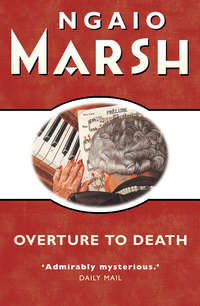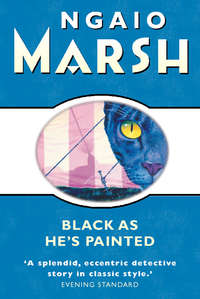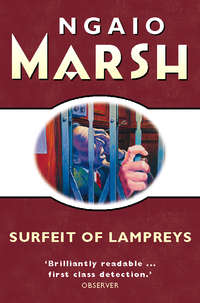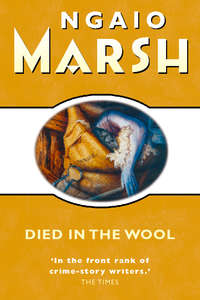
Полная версия
Photo-Finish
They embarked upon the Zig-Zag.
The turns in this monstrous descent were so acute that vehicles travelling in the same direction would seem to approach each other and indeed did pass on different levels. They had caught up with such a one and crawled behind it. They met a car coming up from the gorge. Their own driver pulled up on the lip of the road and the other sidled past on the inner running with half an inch to spare. The drivers wagged their heads at each other.
Alleyn’s arm was across Troy’s shoulders. He pulled her ear. ‘First prize for intrepidity, Mrs A.,’ he said. ‘You’re being splendid.’
‘What did you expect me to do? Howl like a banshee?’
Presently the route flattened out and the driver changed into top gear. They reached the floor of the gorge and drove beside the river, roaring in its courses, so that they could scarcely hear each other speak. It was cold down there.
‘Now you’re in Westland,’ shouted the driver.
Evening was well advanced when, after a two-hour passage through the wet loam-scented forest that New Zealanders call ‘bush’ they came out into more open country and stopped at a tiny railway station called Kai-kai. Here they collected the private mailbag for the Lodge and then drove parallel with the railway for twenty miles, rounded the nose of a hill and there lay a great floor of water: Lake Waihoe.
‘There you are,’ said the driver, ‘That’s the Lake for you. And the Island.’
‘Stay me with flagons!’ said Alleyn and rubbed his head.
The prospect was astonishing. At this hour the Lake was perfectly unruffled and held the blazing image of an outrageous sunset. Fingers of land reached out bearing elegant trees that reversed themselves in the water. Framed by these and far beyond them was the Island and on the Island Mr Reece’s Lodge.
It was a house designed by a celebrated architect in the modern idiom but so ordered that one might have said it grew organically out of its primordial setting. Giants that carried their swathy foliage in clusters stood magnificently about a grassy frontage. There was a jetty in the foreground with a launch alongside. Grossly incongruous against the uproarious sunset, like some intrusive bug, a helicopter hovered. As they looked it disappeared behind the house.
‘I don’t believe in all this,’ said Troy. ‘It’s out of somebody’s dream. It can’t be true.’
‘You reckon?’ asked the driver.
‘I reckon,’ said Troy.
They turned into a lane that ran between tree ferns and underbrush down to the lake edge where there was a garage, a landing stage, a boathouse and a bell in a miniature belfry. They left the car and walked out into evening smells of wet earth, fern and moss and the cold waters of the lake.
The driver rang the bell, sending a single echoing note across the lake. He then remarked that they’d been seen from the Island. Sure enough the launch put out. So still was the evening they could hear the putt-putt of the engine. ‘Sound travels a long way over the water,’ said the driver.
The sunset came to its preposterous climax. Everything that could be seen, near and far, was sharpened and gilded. Their faces reddened. The far-off windows of the Lodge turned to fire. In ten minutes it had all faded and the landscape was cold. Troy and Alleyn walked a little way along the water’s edge and Troy looked at the house and wondered about the people inside it. Would Isabella Sommita feel that it was a proper showplace for her brilliance and what would she look like posing in the ‘commodious studio’ against those high windows, herself flamboyant against another such sunset as the one that had gone by?
Troy said: ‘This really is an adventure.’
Alleyn said: ‘Do you know, in a cockeyed sort of way it reminds me of one of those Victorian romances by George Macdonald where the characters find a looking glass and walk out of this world into another one inhabited by strange beings and unaccountable ongoings.’
‘Perhaps,’ said Troy, ‘the entrance to that great house will turn out to be our own front door and we’ll be back in London.’
They talked about the house and the way in which it rose out of its setting in balanced towers. Presently the launch, leaving an arrowhead of rippled silk in its wake, drew in to the landing stage. It was a large, opulent craft. The helmsman came out of his wheelhouse and threw a mooring rope to the car driver.
‘Meet Les Smith,’ said the driver.
‘Gidday,’ said Les Smith. ‘How’s tricks, then, Bert? Good trip?’
‘No trouble, Les.’
‘Good as gold,’ said the helmsman.
Alleyn helped them stow the luggage. Troy was handed on board and they puttered out on the lake.
The driver went into the wheelhouse with Les Smith. Troy and Alleyn sat in the stern.
‘Here we go,’ he said. ‘Liking it?’
‘It’s a lovely beginning,’ said Troy. ‘It’s so lovely it hurts.’
‘Keep your fingers crossed,’ he said lightly.
II
Perhaps because their day had been so long and had followed so hard on their flight from England, the first night at the Lodge went by rather like a dream for Troy.
They had been met by Mr Reece’s secretary and a dark man dressed like a tarted-up ship’s steward who carried their baggage. They were taken to their room to ‘freshen up’. The secretary, a straw-coloured youngish man with a gushing manner, explained that Mr Reece was on the telephone but would be there to meet them when they came down and that everyone was ‘changing’ but they were not to bother as everybody would ‘quite understand’. Dinner was in a quarter of an hour. There was a drinks tray in the room and he suggested that they should make use of it and said he knew they would be angelic and excuse him as Mr Reece had need of his services. He then, as an apparent afterthought, was lavish in welcome, flashed smiles and withdrew. Troy thought vaguely that he was insufferable.
‘I don’t know about you,’ she said, ‘but I refuse to be quite understood and I’m going to shift my clothes. I require a nice wash and a change. And a drink, by the way.’
She opened her suitcase, scuffled in it and lugged out a jump suit which was luckily made of uncrushable material. She then went into the bathroom which was equipped like a plumber-king’s palace. Alleyn effected a lightning change at which exercise he was a past master and mixed two drinks. They sat side by side on an enormous bed and contemplated their room.
‘It’s all been done by some super American interior decorator, wouldn’t you say?’ said Troy, gulping down her brandy-and-dry.
‘You reckon?’ said Alleyn, imitating the driver.
‘I reckon,’ said Troy. ‘You have to wade through the carpet, don’t you? Not walk on it.’
‘It’s not a carpet: it’s about two hundred sheepskins sewn together. The local touch.’
‘All jolly fine for us to snigger. It’s pretty smashing, really, let’s face it. Not human, though. If only there was something shabby and out of character somewhere.’
‘Us,’ Alleyn said. ‘We’re all of that. Drink up. We’d better not be late.’
On their way downstairs they took in the full effect of the hall with its colossal blazing fireplace, display on the walls of various lethal weapons and hangings woven in the Maori fashion, and a large semi-abstract wood sculpture of a pregnant nude with a complacent smirk. From behind one of the doors there came sounds of conversation. An insistent male voice rose above the rest. There followed a burst of multiple laughter.
‘Good Lord,’ said Alleyn, ‘it’s a house party.’
The dark man who had taken their baggage up was in the hall.
‘In the drawing room, sir,’ he said unnecessarily and opened the door.
About a dozen or so people, predominantly male, were grouped at the far end of a long room. The focal point seemed to be a personage with a grey imperial beard and hair en brosse, wearing a velvet jacket and flowing tie, an eyeglass and a flower in his lapel. His manner was that of a practised raconteur who, after delivering a mot, is careful to preserve an expressionless face. His audience was barely recovered from its fits of merriment. The straw-coloured secretary, indeed, with glass in hand, gently tapped his fingers against his left wrist by way of applause. In doing this he turned, saw the Alleyns and bent over someone in a sofa with its back to the door.
A voice said: ‘Ah yes,’ and Mr Reece rose and came to greet them.
He was shortish and dark and had run a little to what is sometimes called expense-account fat. His eyes were large, and his face closed: a face that it would be easy to forget since it seemed to say nothing.
He shook hands and said how glad he was to receive them: to Troy he added that it was an honour and a privilege to welcome her. There were, perhaps, American overtones in his speech but on the whole his voice, like the rest of him, seemed neutral. He introduced the Alleyns formally to everybody. To the raconteur who was Signor Beppo Lattienzo and who kissed Troy’s hand. To a rotund gentleman who looked like an operatic tenor and turned out to be one: the celebrated Rodolfo Romano. To Mr Ben Ruby who was jocular and said they all knew Troy would do better than that: indicating a vast academic portrait of La Sommita’s gown topped up by her mask. Then came a young man of startling physical beauty who looked apprehensive – Rupert Bartholomew; a pretty girl whose name Troy, easily baffled by mass introductions, didn’t catch, and a largish lady on a sofa who was called Miss Hilda Dancy and had a deep voice, and finally there loomed up a gentleman with an even deeper voice and a jolly brown face who proclaimed himself a New Zealander and was called Mr Eru Johnstone.
Having discharged his introductory duties Mr Reece retained his hold on Alleyn, supervised his drink, led him a little apart and, as Troy could see by the sort of attentive shutter that came over her husband’s face, engaged him in serious conversation.
‘You have had a very long day, Mrs Alleyn,’ said Signor Lattienzo who spoke with a marked Italian accent. ‘Do you feel as if all your time signals had become – ‘ he rotated plump hands rapidly round each other – ‘jumbled together?’
‘Exactly like that,’ said Troy. ‘Jet hangover, I think.’
‘It will be nice to retire?’
‘Gosh, yes!’ she breathed, surprised into ardent agreement.
‘Come and sit down,’ he said, and led her to a sofa removed from that occupied by Miss Dancy.
‘You must not begin to paint before you are ready,’ he said. ‘Do not permit them to bully you.’
‘Oh, I’ll be ready, I hope, tomorrow.’
‘I doubt it and I doubt even more if your subject will be available.’
‘Why?’ asked Troy quickly. ‘Is anything the matter? I mean – ‘
‘The matter? That depends on one’s attitude.’ He looked fixedly at her. He had very bright eyes. ‘You have not heard evidently of the great event,’ he said. ‘No? Ah. Then I must tell you that the night after next we are to be audience at the first performance on any stage of a brand-new one-act opera. A world premiére, in fact,’ said Signor Lattienzo and his tone was exceedingly dry. ‘What do you think about that?’
‘I’m flabbergasted,’ said Troy.
‘You will be even more so when you have heard it. You do not know who I am, of course.’
‘I’m afraid I only know that your name is Lattienzo.’
‘Ah-ha.’
‘I expect I ought to have exclaimed, “No! Not the Lattienzo?"’
‘Not at all. I am that obscure creature a vocal pedagogue. I take the voice and teach it to know itself.’
‘And did you – ?’
‘Yes. I took to pieces the most remarkable vocal instrument of these times and put it together again and gave it back to its owner. I worked her like a horse for three years and I am probably the only living person to whom she pays the slightest professional attention. I am commanded here because she wishes me to fall into a rapture over this opera.’
‘Have you seen it? Or should one say “read it"?’
He cast up his eyes and made a gesture of despair.
‘Oh dear,’ said Troy.
‘Alas, alas,’ agreed Signor Lattienzo. Troy wondered if he was habitually so unguarded with complete strangers.
‘You have, of course,’ he said, ‘noticed the fair young man with the appearance of a quattrocento angel and the expression of a soul in torment?’
‘I have indeed. It’s a remarkable head.’
‘What devil, one asks oneself, inserted into it the notion that it could concoct an opera. And yet,’ said Signor Lattienzo, looking thoughtfully at Rupert Bartholomew, ‘I fancy the first-night horrors the poor child undoubtedly suffers are not of the usual kind.’
‘No?’
‘No. I fancy he has discovered his mistake and feels deadly sick.’
‘But this is dreadful,’ Troy said. ‘It’s the worst that can happen.’
‘Can it happen to painters, then?’
‘I think painters know while they are still at it, if the thing they are doing is no good. I know I do,’ said Troy. ‘There isn’t perhaps the time-lag that authors and, from what you tell me, musicians can go through before they come to the awful moment of truth. Is the opera really so bad?’
‘Yes. It is bad. Nevertheless, here and there, perhaps three times, one hears little signs that make one regret he is being spoilt. Nothing is to be spared him. He is to conduct.’
‘Have you spoken to him? About it being wrong?’
‘Not yet. First I shall let him hear it.’
‘Oh,’ Troy protested, ‘but why! Why let him go through with it. Why not tell him and advise him to cancel the performance.’
‘First of all, because she would pay no attention.’
‘But if he refused?’
‘She has devoured him, poor dear. He would not refuse. She has made him her secretary-accompanist-composer, but beyond all that and most destructively, she has taken him for her lover and gobbled him up. It is very sad,’ said Signor Lattienzo and his eyes were bright as coal nuggets. ‘But you see,’ he added, ‘what I mean when I say that La Sommita will be too much engagée to pose for you until all is over. And then she may be too furious to sit still for thirty seconds. The first dress rehearsal was yesterday. Tomorrow will be occupied in alternately resting and making scenes and attending a second dress rehearsal. And the next night – the performance! Shall I tell you of their first meeting and how it has all come about?’
‘Please.’
‘But first I must fortify you with a drink.’
He did tell her, making a good story of it. ‘Imagine! Their first encounter. All the ingredients of the soap opera. A strange young man, pale as death, beautiful as Adonis, with burning eyes and water pouring off the end of his nose, gazes hungrily at his goddess at one a.m. during a deluge. She summons him to the window of her car. She is kind and before long she is even kinder. And again, kinder. He shows her his opera – it is called The Alien Corn, it is dedicated to her and since the role of Ruth is virtually the entire score and has scarcely finished ravishing the audience with one coloratura embellishment before another sets in, she is favourably impressed. You know, of course, of her celebrated A above high C.’
‘I’m afraid not!’
‘No? It’s second only to the achievement recorded in the Guinness Book of Records. This besotted young man has been careful to provide for it in her aria. I must tell you by the way that while she sings like the Queen of Heaven, musically speaking this splendid creature is as stupid as an owl.’
‘Oh, come!’
‘Believe me. It is the truth. You see before you the assembled company engaged at vast cost for this charade. The basso: a New Zealander and a worthy successor to Inia te Wiata. He is the Boaz and, believe me, finds himself knee deep in corn for which “alien” is all too inadequate a description. The dear Hilda Dancy on the sofa is the Naomi who escapes with a duet, a handful of recitatives and the contralto part in an enfeebled pastiche of “Bella figlia del amore". There she is joined by a mezzo-soprano – (the little Sylvia Parry now talking to the composer). She is, so to speak, Signora Boaz. Next comes the romantic element in the person of Rodolfo Romano who is the head gleaner and adores the Ruth at first sight. She, I need not tell you, dominates the quartet. You find me unsympathetic, perhaps?’ said Signor Lattienzo.
‘I find you very funny,’ said Troy.
‘But spiteful? Yes?’
‘Well – ruthless, perhaps.’
‘Would we were all.’
‘What?’
‘"Ruth"-less, my dear.’
‘Oh, really!’ said Troy and burst out laughing.
‘I am very hungry. She is twenty minutes late as usual and our good Monty consults his watch. Ah! we are to be given the full performance – the Delayed Entrance. Listen.’
A musical whooping could at that moment be heard rapidly increasing in volume.
‘The celestial fire engine,’ said Signor Lattienzo, ‘approaches.’ He said this loudly to Alleyn who had joined them.
The door into the hall was flung wide, Isabella Sommita stood on the threshold and Troy thought: This is it. O, praise the Lord all ye lands, this is it.
The first thing to be noticed about the Sommita was her eyes. They were enormous, black and baleful, and set slantwise in her magnolia face. They were topped by two jetty arcs, thin as a camel-hair brush but one knew that if left to themselves they would bristle and meet angrily above her nose. Her underlip was full, her teeth slightly protuberant with the little gap at the front which is said to denote an amorous disposition.
She wore green velvet and diamonds and her celebrated bosom, sumptuously displayed, shone like marble.
Everyone who had been sitting rose. Alleyn thought: A bit more of this and the ladies would fall to the ground in curtseys. He looked at Troy and recognized the quickened attention, the impersonal scrutiny that meant his wife was hooked.
‘Dar-leengs!’ sang La Sommita. ‘So late! Forgive, forgive.’ She directed her remarkably searching gaze upon them all, and let it travel slowly, rather, Alleyn thought, in the manner of a lighthouse, until it rested upon him, and then upon Troy. An expression of astonishment and rapture dawned. She advanced upon them both with outstretched arms and cries of excitement, seized their hands, giving them firm little shakes as if she was congratulating them on their union and found her joy in doing so too great for words.
‘But you have COME!’ she cried at last and appealed to everyone else. ‘Isn’t it wonderful!’ she demanded. ‘They have COME!’She displayed them, like trophies, to her politely responsive audience.
Alleyn said ‘Hell’ inaudibly and as a way of releasing himself kissed the receptive hand.
There followed cascades of welcome. Troy was gripped by the shoulders and gazed at searchingly and asked if she (the Sommita) would ‘do’ and told that already she knew they were en rapport and that she (the Sommita) always ‘knew’. Didn’t Troy always know? Alleyn was appealed to: ‘Didn’t she?’
‘Oh,’ Alleyn said, ‘she’s as cunning as a bagload of monkeys, Madame. You’ve no idea.’
Further melodious hoots, this time of laughter, greeted the far from brilliant sally. Alleyn was playfully chided.
They were checked by the entry at the far end of the room of another steward-like personage who announced dinner. He carried a salver with what was no doubt the mail that had come with the Alleyns and took it to the straw-coloured secretary who said: ‘On my desk.’ The man made some inaudible reply and seemed to indicate a newspaper on his salver. The secretary looked extremely perturbed and repeated, loudly enough for Alleyn to hear. ‘No, no. I’ll attend to it. In the drawer of my desk. Take it away.’
The man bowed slightly and returned to the doors.
The guests were already in motion and the scene now resembled the close of the first act of an Edwardian comedy, voices pitched rather high, movements studied, the sense, even, of some approach to a climax which would develop in the next act.
It developed, however, there and then. The bass, Mr Eru Johnstone, said in his enormous voice: ‘Do I see the evening paper? It will have the results of the Spring Cup, won’t it?’
‘I should imagine so,’ said Mr Reece. ‘Why?’
‘We had a sweep on Top Note. It seemed a clear indication,’ and he boomed up the room. ‘Everybody! The Cup!’
The procession halted. They all chattered in great excitement but were, as actors say, ‘topped’ by the Sommita demanding to see the paper there and then. Alleyn saw the secretary, who looked agitated, trying to reach the servant but the Sommita had already seized the newspaper and flapped it open.
The scene that followed bore for three or four seconds a far-fetched resemblance to an abortive ruck in rugby football. The guests, still talking eagerly, surged round the prima donna. And then, suddenly, fell silent, backed away and left her isolated, speechless and cross-eyed, holding out the open newspaper as if she intended to drop-kick it to eternity. Alleyn said afterwards that he could have sworn she foamed at the mouth.
Across the front page of the paper a banner headline was splashed.
SOMMITA SAYS NO FALSIES
And underneath:
SIGNED STATEMENT: BY FAMOUS PRIMA DONNA. HER CURVES ARE ALL HER OWN. BUT ARE THEY????
Boxed in a heavy outline, at the centre of the page, were about nine lines of typescript and beneath them the enormous signature – Isabella Sommita
III
Dinner had been catastrophic, a one-man show by the Sommita. To say she had run through the gamut of the passions would be a rank understatement: she began where the gamut left off and bursts of hysteria were as passages-of-rest in the performance. Occasionally she would come to an abrupt halt and wolf up great mouthfuls of the food that had been set before her, for she was a greedy lady. Her discomforted guests would seize the opportunity to join her, in a more conservative manner, in taking refreshment. The dinner was superb.
Her professional associates were less discomforted, the Alleyns afterwards agreed, than a lay audience would have been and indeed seemed more or less to take her passion in their stride, occasionally contributing inflammatory remarks while Signor Romano who was on her left made wide ineffable gestures and when he managed to get hold of it, kissed her hand. Alleyn was on her right. He was frequently appealed to and came in for one or two excruciating prods in the ribs as she drove home her points. He was conscious that Troy had her eyes on him and when he got the chance, made a lightning grimace of terror at her. He saw she was on the threshold of giggles.
Troy was on Mr Reece’s right. He seemed to think that in the midst of this din he was under an obligation to make conversation and remarked upon the lack of journalistic probity in Australia. The offending newspaper, it seemed, was an Australian weekly with a wide circulation in New Zealand.
When the port had been put before him and his dear one had passed for the time being into a baleful silence, he suggested tonelessly that the ladies perhaps wished to withdraw.
The Sommita made no immediate response and a tricky hiatus occurred during which she glowered at the table. Troy thought: Oh, to hell with all this, and stood up. Hilda Dancy followed with alacrity and so after a moment’s hesitation did wide-eyed Sylvia Parry. The men got to their feet.
The Sommita rose, assumed the posture of a Cassandra about to give tongue, appeared to change her mind and said she was going to bed.
About twenty minutes later Alleyn found himself closeted in a room that looked like the setting for a science-fiction film but was Mr Reece’s study. With him were Mr Reece himself, Mr Ben Ruby, Rupert Bartholomew and the straw-coloured secretary whose name turned out to be Hanley.








